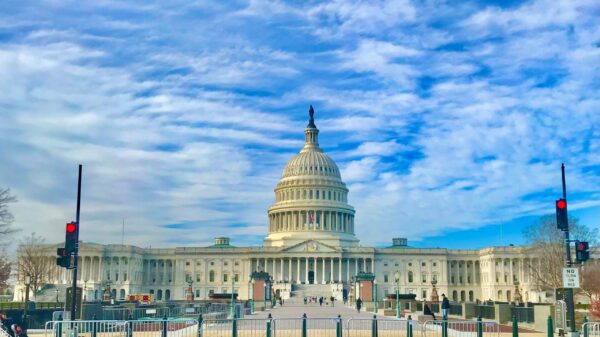ATLANTA, Ga. — A recent campaign advertisement featuring the likeness of U.S. Senator Jon Ossoff, a Democrat, has ignited discussions surrounding the ethical implications of using artificial intelligence (AI) in political electioneering. The ad, created by Republican Congressman Mike Collins, who is vying for Ossoff’s seat in the upcoming midterms, showcases a lifelike representation of Ossoff speaking directly to viewers.
In the ad, Ossoff’s AI-generated likeness states, “I just voted to keep the government shutdown. They say it’ll hurt farmers, but I wouldn’t know. I’ve only seen a farm on Instagram.” While the advertisement adheres to existing state and federal laws, it includes a disclaimer at the bottom, yet it has raised significant concerns about the responsible application of new technologies in political messaging.
Collins defended his decision to utilize Ossoff’s AI likeness, stating, “Our team is doing it just like the White House. Just like everybody else out there. You’re not going to stop technology. Just embrace it and go with it. It’s going to be the way you see things go from now on.”
The Democratic Party of Georgia criticized the ad as lacking integrity, with Ossoff’s campaign asserting that the use of a deepfake to misrepresent an opponent’s statements is fundamentally dishonest. A spokesperson for Ossoff remarked, “The only reason a candidate would need to use a deepfake to make up an opponent’s words and manipulate a video to deceive Georgians is if they didn’t think they could win on their own. Georgians don’t take well to people who lie to them.”
Political and Ethical Implications of AI in Campaigning
This incident highlights the complex intersections between AI technology, political decorum, and free speech. Georgia lawmakers have previously explored these issues, proposing legislation aimed at curbing the misuse of AI in political campaigns. Last year, they introduced Senate Bill 9, which was passed with bipartisan support. This bill establishes criminal penalties—including prison time and felony charges—for anyone who intentionally creates misleading AI campaign material within 90 days of an election without proper disclaimers.
The requirements outlined in the bill dictate that disclaimers must clarify the names of individuals being impersonated, indicate that events may not have occurred as depicted, and disclose that AI was utilized in creating the advertisement. Despite passing in 2025, the conversation surrounding the ethical usage of AI in political contexts continues to evolve.
State Representative Brad Thomas, who played a key role in drafting the legislation, acknowledged the controversial nature of the Ossoff ad but characterized it as satire. He stated, “The crux of that bill is intent to deceive, and when you put a stamp on it that says it’s AI generated, at that point you’re not attempting to deceive anybody. I don’t always love it, but it’s okay. We’re going to have to accept that as part of the political process.”
However, many voters express concern over the implications of using AI-generated content in campaign advertisements. Jimmy Schapp, a computer technology instructor at Atlanta Public Schools, highlighted the potential for confusion among less tech-savvy voters. “The first thing I thought was, there’s going to be a lot of the electorate that aren’t going to recognize this as a deepfake,” Schapp noted. “You’re misleading folks in a way that’s not just dishonest; it’s morally and ethically wrong.”
This situation underscores the urgent need for regulatory frameworks to address the application of AI in political marketing. As AI technologies become increasingly sophisticated, the challenge lies in balancing innovation with the integrity of democratic processes. The potential for AI to distort reality in political contexts raises ethical questions that society must confront as we navigate an era where technology and politics are becoming ever more intertwined.
The ongoing discourse surrounding AI usage in elections serves as a crucial reminder of the responsibilities that come with technological advancement. As the political landscape adapts to these emerging tools, ensuring transparency and accountability remains imperative for fostering public trust.
See also IBM Integrates AI Platform into Microsoft 365, Saving Consultants 250,000 Hours Annually
IBM Integrates AI Platform into Microsoft 365, Saving Consultants 250,000 Hours Annually Yang Hongxia’s InfiX.ai Aims for Decentralized Generative AI with $250M Valuation
Yang Hongxia’s InfiX.ai Aims for Decentralized Generative AI with $250M Valuation New Study Reveals 43% Domain Overlap Between Perplexity and Google Results
New Study Reveals 43% Domain Overlap Between Perplexity and Google Results Tuscaloosa City Schools Launch AI Initiative to Enhance Classroom Learning by 2026
Tuscaloosa City Schools Launch AI Initiative to Enhance Classroom Learning by 2026 Hugging Face CEO Warns LLM Enthusiasm May Eclipse Broader AI Potential
Hugging Face CEO Warns LLM Enthusiasm May Eclipse Broader AI Potential






































































